NFL players stir controversy with Ferguson tribute
- Published
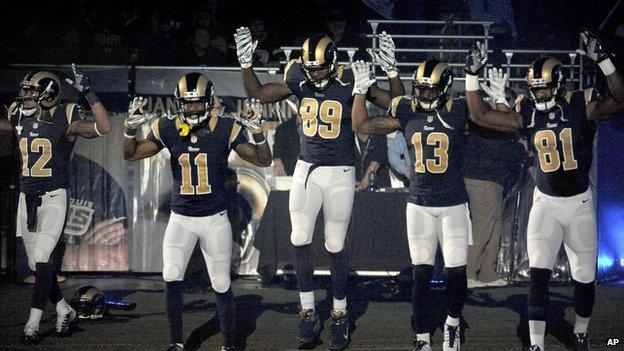
Five American football players in St Louis took the field on Sunday with the "hands up, don't shoot" gesture that has become a symbol of protest for those angered by Ferguson police officer Darren Wilson's killing of black teenager Michael Brown.
According to some witness testimony - contradicted by others and apparently dismissed by the grand jury that declined to indict Mr Wilson - Brown's hands were raised in surrender when he was fatally shot in St Louis suburb of Ferguson.
The action by the players now threatens to engulf the NFL in the growing debate over the police shooting and, more largely, racial justice in the US.
"We kind of came collectively together and decided we wanted to do something," said Jared Cook, external, one of the participants. "So we wanted to come out and show our respect to the protests and the people who have been doing a heck of a job around the world."
"We wanted to let the community know that we support the community," another player, Kenny Britt, said.
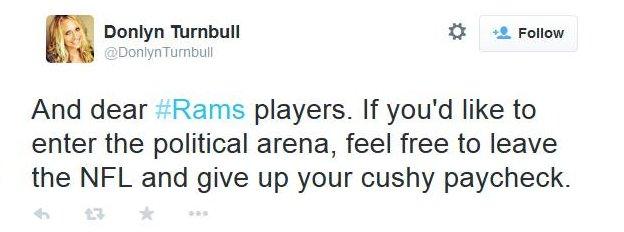
Later on Sunday the St Louis Police Officers Association issued a statement, external condemning the display. Jeff Roorda, the association's business manager and a representative in the Missouri legislature, said:
"Now that the evidence is in and Officer Wilson's account has been verified by physical and ballistic evidence as well as eyewitness testimony, which led the grand jury to conclude that no probable cause existed that Wilson engaged in any wrongdoing, it is unthinkable that hometown athletes would so publicly perpetuate a narrative that has been disproven over-and-over again."
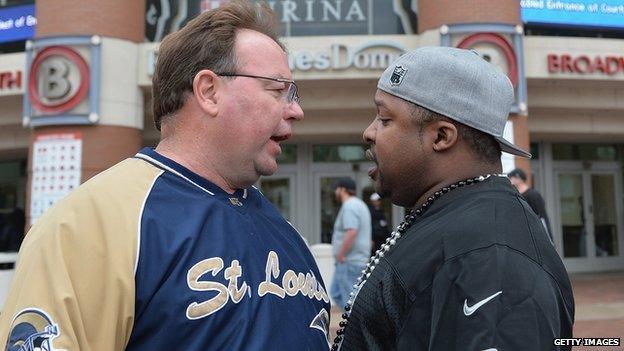
Protestors and fans scuffle outside the St Louis Rams stadium on Sunday
The association called for the players to be disciplined by the Rams and for the NFL to issue a "very public apology".
"I know that there are those that will say that these players are simply exercising their First Amendment rights," Mr Roorda said. "Well I've got news for people who think that way. Cops have first amendment rights too, and we plan to exercise ours. I'd remind the NFL and their players that it is not the violent thugs burning down buildings that buy their advertiser's products. It's cops and the good people of St Louis and other NFL towns that do."
It probably shouldn't be a surprise that the Ferguson controversy has spilled over into US sport - as controversial social issues often do. In 1968 US Olympians raised a black-gloved fist in a black power salute while on the medal podium.
In 2012 players on the Miami Heat basketball team posed in hooded sweatshirts, external to express solidarity with Trayvon Martin, a black teen who had been shot and killed by an armed civilian in Florida. Players from the Washington Redskins had engaged in a similar show of support, external for Michael Brown in August.
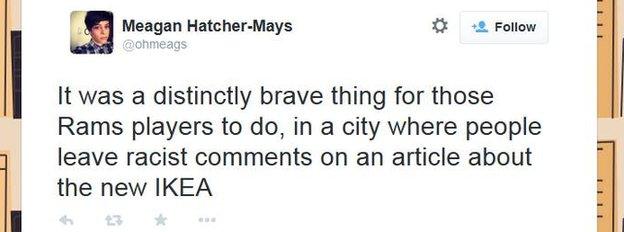
Moreover, the NFL is more than just a Sunday afternoon pastime, it's a major cultural phenomenon. The Rams and the NFL had reportedly been consulting with local authorities about the possibilities of demonstrations affecting the game.
Coming on the heels of the violent clashes between protestors and police when the grand jury's decision was announced last week, a protest by St Louis players likely would capture the nation's attention - and it did. Social media exploded with reaction, and commentators were quick to weigh in.
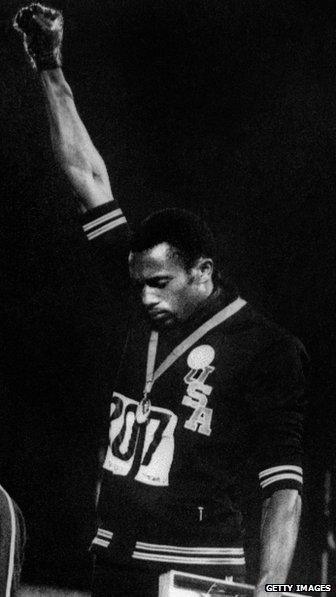
US Tommie Smith would be suspended from the US track team following his "black power" salute during the 1968 Olympics
"Even if we didn't have miles of grand jury testimony and forensic evidence showing that Mike Brown initiated the confrontation which ended his life, and no matter how you feel about the state of community relations with law enforcement, the football stadium is not the place for this," writes, external Hot Air blog's Jazz Shaw.
He says that NFL should be about football and entertainment, not political statements of any stripe. "The Rams need to pull these guys aside and put an end to this," he concludes.
The demonstrations are an "indicator of how deeply Ferguson has touched America," writes, external the Christian Science Monitor's Mark Sappenfield.
"The fact that five Rams took the one moment they could be sure that the stadium was watching to show their solidarity with Ferguson, then, is significant," he writes. "Clearly, it was coordinated. Clearly, it was something that felt that they could not not do."
The NFL players have a right to express their views, says, external St Louis Post-Dispatch sports columnist Bernie Miklasz.
"Please don't tell me that players should keep their mouths shut on a volatile issue that's confronting St Louis in a profound way," he writes. "And it's about time that people speak up so we can have open dialogue on a matter of critical importance. This isn't North Korea."
Given the stakes, and the acrimony surrounding the Ferguson issue, it wasn't long before supporters on both sides began digging into the backgrounds of Sunday's key participants.
DC Clothesline blogger Dean Garrison says, external that all five of the Rams players have what he views as questionable backgrounds, ranging from arrests to disciplinary action by the NFL.
"These five men may not be hardened criminals, but they are obviously not choir boys either," he writes.
Labelling them "thugs", he adds: "They disrespected their teammates. They disrespected the fans. They disrespected their city. They disrespected all of America."
Deadspin's Timothy Burke writes, external that Mr Roorda is a former police officer who was fired after "repeatedly lying and falsifying reports".
During his work in the legislature, writes, external Think Progress's Travis Waldron, Mr Roorda "has pushed back against reform ideas that have become popular in the wake of Brown's death, including the idea that police should wear body cameras" and helped raise money for officer Wilson.
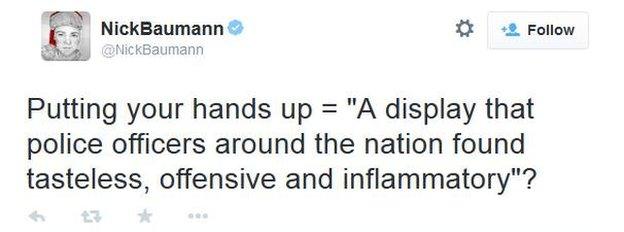
Although the NFL has been quick to punish displays of "unsportsmanlike behaviour" on the field, including a controversial, open-ended penalty for offensive language, it has generally given players more freedom for political expression. On Monday the league announced it will not, external discipline the players.
Last week New Orleans player Benjamin Watson wrote a viral Facebook post, external about his mixed emotions following the grand jury action.
"I'm angry," he wrote, "because the stories of injustice that have been passed down for generations seem to be continuing before our very eyes."
Yahoo's Frank Schwab writes, external that a player was fined for "negative comments" about openly gay player Michael Sam, "but that was a violation of the league's anti-discrimination policies".
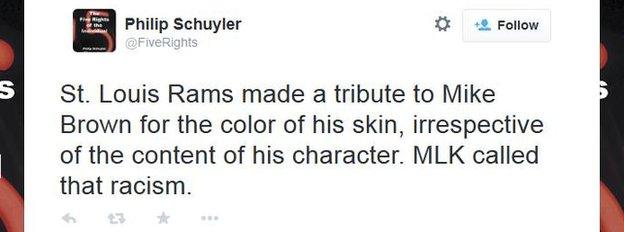
"Given how much controversy the NFL has unwittingly found itself in this year, it will be very careful about anything it says about the Rams' statement, if it says anything at all," he writes.
The NFL has found itself in yet another delicate situation. It could risk angering those who support the grand jury's decision not to indict Mr Wilson and who view the protests as a misguided, lawless action. Or take sides against the demonstrators on a issue that is exposing sharp racial divides in the US when 68% of its players are black.
For now it seems the NFL has opted for the former.